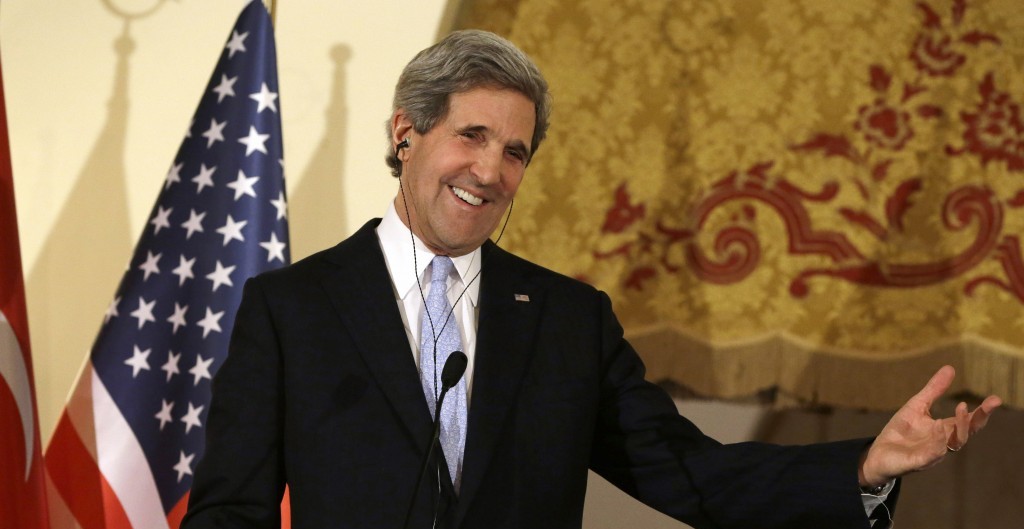The New York Times reports that Secretary of State John Kerry is not pessimistic about the Israeli-Palestinian “peace process.” In Jerusalem to begin a little shuttle diplomacy between the Israeli capital and Ramallah, he said he hopes that by “being methodical, careful, patient, but detailed and tenacious, that we can lay out a path ahead that could conceivably surprise people.”
To Kerry’s credit, he is not feigning optimism. His words are quite precise in fact. He only hopes that he will succeed in laying out a path that might “surprise people.”
That wouldn’t take much because any movement at all would be a surprise. Merely getting Prime Minister Benjamin Netanyahu to acknowledge that he hopes that someday there will be peace with the Palestinians would count as a surprise, although it would be meaningless.
| Secretary of State John Kerry hopes to “surprise people” in the peace process. That wouldn’t take much because any movement at all would be a surprise. |
But nothing of any significance will be achieved by Kerry’s trip. That is because the “peace process” is about Israel exchanging the West Bank for peace and recognition from the Palestinians.
This exchange was encapsulated in United Nations Resolution 242, passed in 1967 under U.S. sponsorship, which has remained the core of every Middle East peace proposal since.
The “land for peace” exchange has not taken place, and it won’t despite Kerry’s efforts, because Israel intends to keep the West Bank, not only keep it but thoroughly colonize it until it is as Israeli as Tel Aviv.
There are today 350,000 Israeli settlers in the West Bank (double the number in 2000). Netanyahu has made clear that those settlers are staying, and that their numbers will grow. Referring to Prime Minister Sharon’s removal of settlements from Gaza, Netanyahu said, “the days of the bulldozers uprooting Jews are behind us, not before us.”
Nothing Netanyahu has done in office indicates that he is being anything other than totally sincere. He intends to keep the land. There will be no Palestinian state there.
That being the case, there really is nothing to negotiate. Yes, Resolution 242 has two parts. One calls for Israel returning the land while the other calls for recognition of Israel and its right to security. Happily, there is no need to negotiate about that second part as the Palestinians, under Yasir Arafat, accepted those conditions in 1993. Although Hamas in Gaza does not recognize Israel, the Palestinian Authority (which controls the West Bank) not only accepts Israel, it essentially patrols the West Bank for Israel. It could not be more accepting of Israel if it adopted Judaism as the religion of any future Palestinian state. And it is the Palestinian Authority, not Hamas, with whom Kerry is trying to broker peace.
None of this matters to Netanyahu or the rightists that constitute his governing coalition. Even Israel’s Finance Minister, Yair Lapid, who was elected in January as a moderate, and was always perceived as such, now says that he too wants to hold the West Bank and expand settlements. As for Gaza, nominally free of Israeli control, it is still blockaded by Israel which controls its land, sea and air. And Gaza, according to Israel, is no longer occupied.
| The two-state solution is the official policy of Israel but it will not be put into effect. |
As I was writing this, I received an email from J Street, the organization that was set up as the alternative to the pro-Netanyahu Israel lobby. It has been reduced to asking its members to contact Israel’s ambassador to the United States to say the following:
Ambassador Oren, please clarify the recent remarks by members of Knesset that the two-state solution is not the official policy of the Israeli government right away.
Pathetic, isn’t it?
The answer to J Street’s query is, of course, “yes.” The “two-state solution” is the official policy of the Israeli government. It will, however, not be put into effect.
Of course, the United States could change that if President Obama linked the continued provision of aid to Israel to its agreeing to abide by the terms of United Nations Resolution 242 and the other land-for-peace agreements. But he won’t do that. The Democratic Party is too dependent on funding from donors associated with the Israel lobby for that kind of action.
And that is why the Kerry mission is a joke.
It is also why, Obama, Kerry and the rest of the administration should stop even paying lip service to the idea that there is a “peace process.” Pretending it still exists only helps Netanyahu. He can keep all the land, keep expanding settlements and still tell the Israeli people that he is working with the United States to achieve peace. That way he has his cake and eats it too. We are playing his game by his rules.
Enough. There is no “peace process.”
The world’s last remaining superpower has more than met its match.
And it folded.
M.J. Rosenberg is a Special Correspondent for The Washington Spectator. He was most recently a Foreign Policy fellow at Media Matters For America. Previously, he spent 15 years as a Senate and House aide. Early in his career he was editor of AIPAC’s newsletter Near East Report. From 1998-2009, he was director of policy at Israel Policy Forum. Follow him @MJayRosenberg and @WashSpec. (Image source: Times of Israel.)



0 Comments